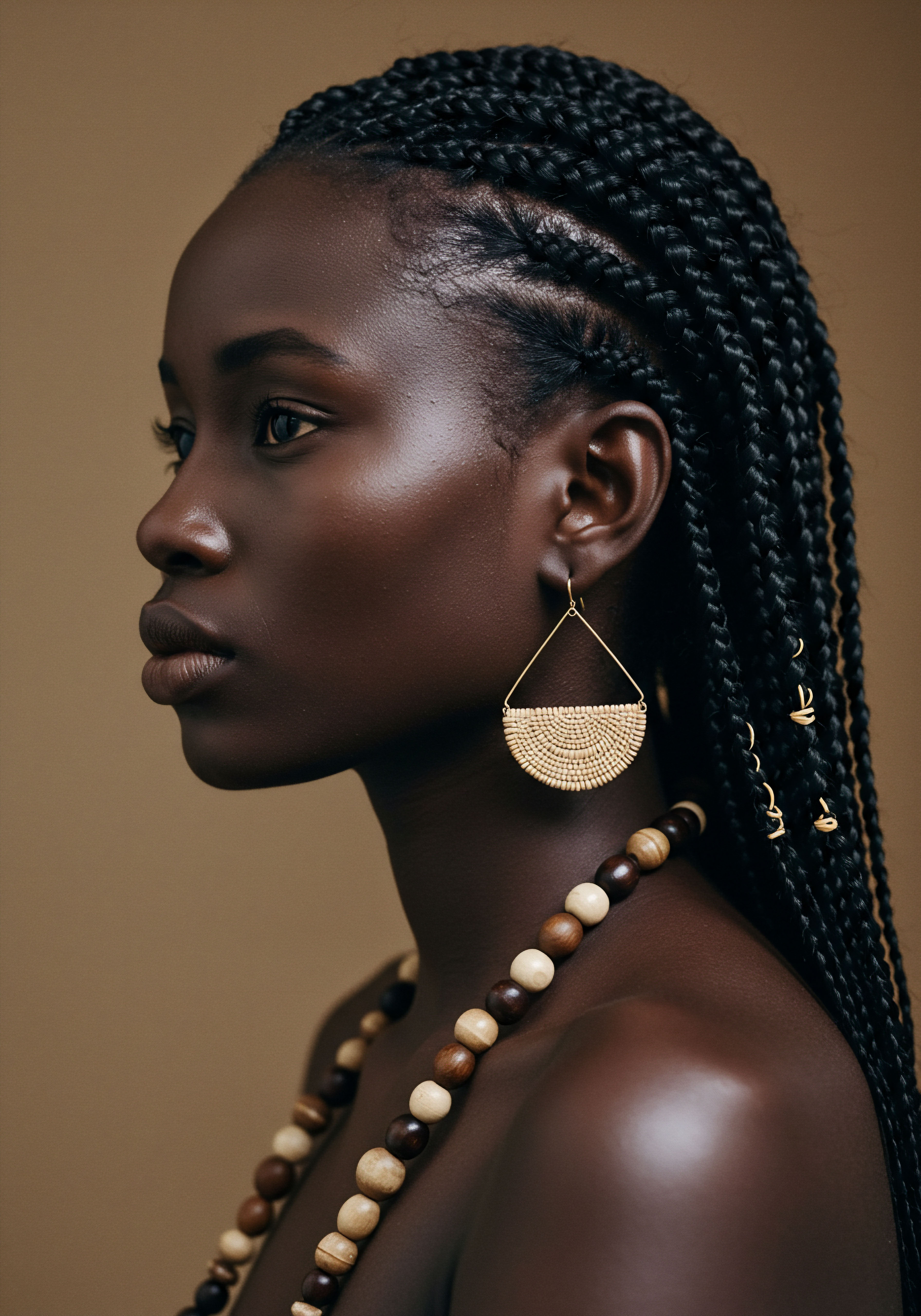
Roots
Consider for a moment the silent, unseen rhythms that govern our very being. Beneath the surface of our daily lives, a delicate choreography unfolds within our bodies, influencing everything from the quiet hum of our thoughts to the vitality of our strands. It is a profound connection, often overlooked, yet undeniably present ❉ the intricate dance between our sleep patterns and the subtle story our hair tells. For those of us with textured hair, this connection carries an even deeper resonance, intertwined with generations of care, understanding, and the wisdom of listening to our bodies’ subtle signals.
The shedding of hair, a natural process, is a continuous cycle of renewal. Each strand follows a programmed journey through distinct phases. First, there is the Anagen Phase, a period of active growth where cells divide rapidly, forming the hair shaft. This phase can last for years.
Following this, a brief transitional period, the Catagen Phase, sees growth slow as the follicle prepares for rest. Finally, the Telogen Phase, a resting period, arrives before the hair is gently released, making way for new growth. This rhythmic progression, a testament to the body’s innate wisdom, is precisely where sleep casts its quiet, yet powerful, influence.

Hair Follicle Rhythms and Sleep’s Deep Connection
The hair follicle itself operates on a biological clock, a localized circadian rhythm that guides its activities. During periods of deep, restorative sleep, the body dedicates itself to repair and regeneration. This includes a heightened cellular turnover and tissue repair throughout the body, including the scalp and hair follicles. Hormones crucial for growth, such as melatonin and growth hormone, see their levels rise.
These factors provide a supportive environment for the anagen, or active growth, phase of the hair cycle. When sleep is disturbed or insufficient, this crucial restorative work is hindered, potentially shortening the growth phase and contributing to a quicker transition into the resting, and subsequently, shedding phases.
The very architecture of hair growth, from its cellular foundations, responds to the deep, silent rhythms of our sleep.
Scientific understanding continues to deepen, revealing how these internal clocks within our hair follicles are influenced by the larger, overarching circadian rhythm of our bodies. Disruptions to this grand internal timing mechanism, such as those caused by irregular sleep schedules, can alter the delicate balance required for healthy hair cycling. Research indicates that core clock genes within human hair follicles, like BMAL1 and PER1, play a significant role in regulating the hair cycle. Alterations to these genes have been observed to affect the progression of hair growth phases.
Consider the cells that give rise to our hair ❉ keratinocytes. These cells exhibit a pronounced circadian rhythm in their proliferation. Studies show that their activity is considerably higher at night, underscoring the night’s importance for cellular repair and renewal within the skin and, by extension, the hair follicles. When we consistently deny our bodies this essential nocturnal period of restoration, we subtly, yet surely, interfere with the hair’s inherent capacity for robust growth and renewal.
The hair follicle, a tiny organ, constantly cycles through states of growth, regression, and rest. This cyclical process is remarkably similar to the intrinsic rhythms seen across many biological systems. A deeper understanding of this internal association between the body’s clock and hair follicles is essential for truly comprehending the potential mechanisms of hair shedding.
Hair Follicle Activity is profoundly impacted by sleep.
- Anagen ❉ The active growth phase, heavily reliant on the body’s restorative sleep processes.
- Catagen ❉ A brief transition where the hair follicle prepares for rest.
- Telogen ❉ The resting phase, preceding the natural release of the hair strand.

Ritual
As we step beyond the foundational science, we arrive at the tangible ways our sleep patterns shape the very vitality of our hair. It is here, in the daily and nightly practices, that the quiet whispers of our body’s internal clock become louder, influencing not just hair’s presence on our scalp, but its overall demeanor. For textured hair, which often calls for a mindful, gentle approach, the consistency of our sleep ritual can be as significant as the products we choose.
The body’s natural response to insufficient or erratic sleep is often a surge in stress hormones, particularly Cortisol. This hormone, while essential for acute stress responses, becomes a disruptive force when consistently elevated. Chronic high cortisol levels have been strongly linked to conditions where hair follicles prematurely enter the resting phase, leading to excessive shedding. This temporary form of hair loss, known as telogen effluvium, is a common consequence of sustained stress, including that brought on by sleep inconsistencies.
The consistency of our sleep ritual can determine the quiet rhythm of our hair’s well-being.

How Sleep Inconsistencies Influence Hair Shedding?
When sleep is irregular, the body’s ability to regulate its delicate hormonal balance is compromised. Melatonin, often associated with sleep, also plays a role in controlling the hair growth cycle. A reduction in melatonin levels, often seen with poor sleep, can hinder new hair formation, contributing to thinning or shedding.
Beyond melatonin, sleep also impacts other hormones, including growth hormone, testosterone, and estrogen, all of which hold sway over hair health. An imbalance in any of these, stemming from disrupted sleep, can manifest as visible changes in hair density and strength.
Consider the profound impact of poor sleep on blood circulation. During deep sleep, blood flow to the scalp increases, delivering oxygen and vital nutrients directly to the hair follicles. This nourishment is paramount for robust hair growth. When sleep is frequently disrupted, this essential circulation can falter, depriving hair follicles of the sustenance they require.
Such deprivation can weaken strands and contribute to increased shedding. A healthy scalp, a vibrant foundation for textured hair, relies on this consistent blood supply, making consistent sleep an unspoken ally in its maintenance.
The subtle cues of a disrupted sleep schedule can often be seen in the hair’s response. This isn’t about a single sleepless night leading to immediate hair fall; rather, it speaks to the cumulative effect of prolonged inconsistency.
| Physiological Aspect Stress Hormone Levels |
| Influence of Inconsistent Sleep Elevated cortisol and adrenaline. |
| Hair Manifestation Increased shedding, telogen effluvium. |
| Physiological Aspect Hormonal Balance |
| Influence of Inconsistent Sleep Reduced melatonin, altered growth hormones. |
| Hair Manifestation Hair thinning, reduced growth, weaker strands. |
| Physiological Aspect Scalp Blood Flow |
| Influence of Inconsistent Sleep Decreased circulation to follicles. |
| Hair Manifestation Nutrient deprivation, weaker hair. |
| Physiological Aspect Immune System Strength |
| Influence of Inconsistent Sleep Weakened defenses, increased inflammation. |
| Hair Manifestation Inflammation around follicles, potential autoimmune flare-ups. |
| Physiological Aspect The body's nocturnal restorative processes are paramount for resilient hair. |

Why Does Sleep Timing Matter for Hair’s Vitality?
The regularity of sleep, the consistent adherence to a bedtime and wake-up schedule, is often more important than simply the duration of sleep. This consistency helps to stabilize the body’s circadian rhythm, which in turn supports balanced hormone production and cellular repair. When our sleep timing is erratic, our internal clocks struggle to synchronize, leading to a cascade of physiological imbalances that can manifest in our hair.
For individuals with textured hair, who often navigate the complexities of moisture retention and delicate strands, the consequences of compromised hair health due to sleep inconsistencies can be particularly noticeable. Hair may feel drier, appear duller, or experience increased breakage, as its foundational health is undermined. Prioritizing a consistent sleep schedule becomes a simple yet powerful act of self-care, a gentle ritual that supports the very core of hair vitality.

Relay
Moving beyond the immediate observations, we now consider the deeper, less apparent complexities that connect our sleep patterns to the subtle shedding of our hair. This is where the interwoven threads of biology, psychology, and even cultural context reveal a more complete picture, showing how a consistent sleep rhythm acts as a silent guardian for our strands. The journey of hair health is not a solitary path, but one influenced by a symphony of internal and external factors, with sleep holding a significant baton.
The human hair follicle, far from a simple structure, is a dynamic mini-organ with its own intrinsic circadian clock. This localized clock within the follicle itself works in concert with the body’s central pacemaker, the suprachiasmatic nucleus, to regulate the hair growth cycle. Research indicates that disruptions to these internal follicular clocks can lead to alterations in cell cycle progression within the hair follicle.
For example, studies on clock genes like BMAL1 and PER1 have shown their influence on the anagen (growth) phase. When these genes are compromised, the growth phase can be affected, potentially shortening it and pushing more hairs into the resting phase.
Hair’s resilience reflects a complex interplay of internal clocks, cellular harmony, and external influences.

Can Circadian Disruption Directly Influence Hair Follicle Behavior?
The connection between sleep inconsistencies and hair shedding is not always a direct cause-and-effect; often, it operates through intermediaries, primarily stress and its physiological responses. When sleep is fragmented or insufficient, the body interprets this as a form of stress, triggering the release of cortisol. Elevated cortisol levels can force a significant number of hair follicles into the telogen (resting) phase prematurely, leading to a noticeable increase in shedding, a condition known as Telogen Effluvium. This can occur weeks or months after the initial stressor.
A compelling example of this indirect yet potent connection comes from studies on autoimmune conditions. For instance, a 2022 study involving 102 adults, half diagnosed with Alopecia Areata and half without hair loss, illuminated a complex relationship between this autoimmune disorder and poor sleep. Researchers observed that insufficient sleep could serve as a trigger for flare-ups in autoimmune conditions, including alopecia areata.
This suggests that a vicious cycle can arise ❉ alopecia areata contributes to stress, anxiety, and depression, which in turn disrupt sleep, potentially leading to further hair loss. This finding highlights how deeply intertwined our sleep, stress response, and hair health truly are, particularly for those navigating autoimmune challenges.
Beyond stress hormones, sleep irregularities can also disturb the delicate balance of other hormones vital for hair vitality. Melatonin, often known for its role in sleep regulation, also exhibits antioxidant and anti-inflammatory properties within the body, including effects on hair follicles. Some research points to melatonin’s potential to influence hair growth, with studies suggesting that topical melatonin may improve hair growth, density, and thickness in certain forms of alopecia. When our sleep schedule is inconsistent, the natural production and rhythm of melatonin can be compromised, potentially affecting its supportive role in hair health.

What Are the Broader Societal and Cultural Impacts on Sleep and Hair?
The conversation around sleep and hair health extends beyond individual biology to touch upon broader societal and cultural dimensions. Sleep patterns are not solely determined by personal choice; they are also shaped by cultural values, practices, and even systemic factors. For example, cultural perceptions of sleep, often viewing it as a less productive activity compared to work or social obligations, can inadvertently lead to widespread sleep deprivation.
Consider the phenomenon of shift work. Individuals engaged in professions requiring irregular hours, such as healthcare workers or those in service industries, often face chronic circadian disruption. This constant battle against the body’s natural sleep-wake cycle can have significant physiological consequences, including altered hormonal profiles and heightened stress responses, which can, in turn, influence hair shedding patterns. While direct studies specifically on shift work and textured hair shedding are still growing, the general biological principles of circadian disruption and its downstream effects on stress and hormones apply universally.
The societal emphasis on constant productivity and accessibility, particularly in modern contexts, often devalues the profound restorative power of consistent sleep. This cultural backdrop can make it challenging for individuals to prioritize sleep hygiene, inadvertently contributing to issues like increased hair shedding. Understanding these broader influences allows for a more compassionate and comprehensive approach to hair wellness, recognizing that personal habits exist within a larger cultural framework.
- Cortisol ❉ A primary stress hormone, elevated by inconsistent sleep, which can prematurely push hair follicles into the resting phase.
- Melatonin ❉ A hormone influencing sleep and hair growth, whose production can be disrupted by irregular sleep patterns.
- Circadian Clock Genes ❉ Internal biological timers within hair follicles that regulate growth cycles, susceptible to external sleep disruptions.
| Condition Telogen Effluvium |
| Sleep Connection Often triggered by stress from sleep deprivation, leading to excessive shedding. |
| Supporting Research Studies consistently link high cortisol from poor sleep to this condition. |
| Condition Alopecia Areata |
| Sleep Connection Significant association with sleep disturbances; insufficient sleep can trigger autoimmune flare-ups. |
| Supporting Research A 2022 study of 102 adults showed a complex connection. |
| Condition Androgenetic Alopecia |
| Sleep Connection Some research suggests a link between sleep disturbances and severity, particularly male pattern baldness. |
| Supporting Research A 2022 study found a significant association with sleep disturbances. |
| Condition The intricate relationship between sleep and hair health spans various forms of hair loss. |

Reflection
The story of our hair, particularly textured hair, is deeply personal, yet it mirrors the broader rhythms of our lives and the world around us. As we consider the profound connection between sleep schedule inconsistencies and hair shedding, it becomes clear that true hair wellness extends far beyond topical treatments. It calls for a gentle attunement to our body’s inherent wisdom, a respectful acknowledgment of its cycles, and a conscious choice to honor the restorative power of consistent rest. In a world that often urges constant motion, pausing to nurture our sleep is not merely a luxury, but a fundamental act of care for our entire being, including the beautiful strands that adorn us.

References
- The Hairy Pill. Does Lack of Sleep Cause Hair Loss? 2025.
- Hair Doctors. Can Lack of Sleep Make You Lose Hair? Uncovering the Connection. 2025.
- Treatment Rooms London. Can A Lack of Sleep Cause Hair Loss? 2024.
- Hims. Does Lack of Sleep Cause Hair Loss? 2024.
- Sleep Centers of Middle Tennessee. Can Sleep Apnea Cause Hair Loss? 2021.
- HHC Clinics. Sleep and Hair Growth – What’s the Connection? 2024.
- Wimpole Clinic. Can Lack of Sleep Cause Hair Loss? 2024.
- Niu, Y. Overview of the Circadian Clock in the Hair Follicle Cycle. Biomolecules, 2023, 13(7), 1068.
- Fischer, T. W. Slominski, A. & Paus, R. Melatonin and the human hair follicle ❉ An update. Journal of Pineal Research, 2008, 44(2), 173-181.
- Niu, Y. & Li, Y. Melatonin and the Human Hair Follicle. Journal of Drugs in Dermatology, 2023, 22(3), 316-320.
- LearnSkin. How Does the Circadian Rhythm Affect Hair Growth? 2017.
- Clinikally. Impact of Sleep Deprivation on Hair Health. 2024.
- Limmer Hair Transplant Center. Can Lack of Sleep Cause Hair Loss? 2025.
- Healthline. Does Melatonin Cause Hair Loss? What Research Shows. 2024.
- Niu, Y. & Li, Y. Melatonin and the Human Hair Follicle. PubMed, 2023, 22(3), 316-320.
- Niu, Y. & Li, Y. Melatonin and the Human Hair Follicle. JDDonline – Journal of Drugs in Dermatology, 2023, 22(3), 316-320.
- Capilclinic USA Blog. Does Sleep Apnea Cause Alopecia? 2023.
- Health. Is Stress Responsible For Telogen Effluvium? Here’s What You Need To Know. 2023.
- Niu, Y. Overview of the Circadian Clock in the Hair Follicle Cycle. SciSpace, 2023.
- HairFree & HairGrow. Sleep and Hair Loss. Relationship Explained. 2023.
- Boland, E. & Maibach, H. I. Biological Rhythms in the Skin. International Journal of Molecular Sciences, 2016, 17(5), 724.
- Maibach, H. I. & Boland, E. The Influence of Circadian Rhythms on DNA Damage Repair in Skin Photoaging. International Journal of Molecular Sciences, 2023, 24(17), 13346.
- HCPLive. Hair, Scalp Health Linked to Perceived Stress and Sleep Quality. 2025.
- Plikus, M. V. Gay, D. L. Treutlein, B. et al. Clock genes, hair growth and aging. Aging-US, 2012, 4(7), 475-481.
- MONPURE. Hair Loss ❉ Is Lack of Sleep Stunting Growth? 2024.
- Dr Serkan Aygin Clinic. Do Your Sleeping Habits Affect Your Hair Loss? 2022.
- Centre Clauderer. Hair and sleep ❉ the importance of the night for hair health. 2025.
- Pan, M. Li, X. Wu, L. et al. Hair Follicles as a Critical Model for Monitoring the Circadian Clock. International Journal of Molecular Sciences, 2023, 24(3), 2697.
- Kim, J. E. & Choi, H. S. Acne Severity and Sleep Quality in Adults. Clocks & Sleep, 2019, 1(4), 510–516.
- Niu, Y. Overview of the Circadian Clock in the Hair Follicle Cycle. ResearchGate, 2023.
- Handayani, F. R. & Setyaningrum, A. The Relationship of Sleep Quality with Severity Level Acne Vulgaris in Students Aged 17-21 Years. PSPP Journals, 2023, 1(1), 1-8.
- Al-Nuaimi, R. & Al-Marzouq, A. Integrative and Mechanistic Approach to the Hair Growth Cycle and Hair Loss. Cureus, 2023, 15(11), e48858.
- Project Sleep. Podcast ❉ Shifting Cultural Perceptions of Sleep with Dr. Grandner. 2020.
- Kim, J. E. & Choi, H. S. Circadian Rhythm and the Skin ❉ A Review of the Literature. Journal of Clinical and Aesthetic Dermatology, 2019, 12(9), 11-18.
- Sun, W. & Zhang, J. A Systematic Review on Cross-Cultural Comparative Studies of Sleep in Young Populations. International Journal of Environmental Research and Public Health, 2021, 18(3), 1253.
- Owens, J. A. Sleep in children ❉ Cross-cultural perspectives. Sleep Medicine Reviews, 2004, 8(4), 263-271.
- Harvard University. Genetics, Aging and Sleep ❉ Genetics of Sleep. 2023.
- Turner, K. Where We Sleep Matter? Black Health, 2023.